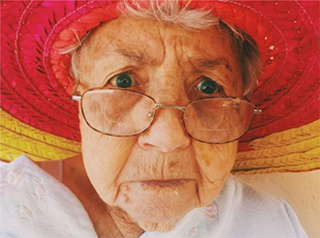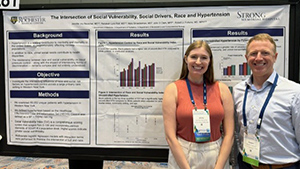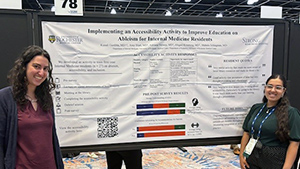News & Events
In the Division
Home is Where the Hospital Is: Hospital at Home Program Launching in September
Thursday, June 12, 2025
 Meet Edna, a fiercely independent 82-year-old who lives alone with family support. The last place Edna wants to be is in the hospital, but she can’t ignore her worsening shortness of breath and swelling legs.
Meet Edna, a fiercely independent 82-year-old who lives alone with family support. The last place Edna wants to be is in the hospital, but she can’t ignore her worsening shortness of breath and swelling legs.
Under the current UR Medicine system, Edna would be admitted to the hospital to receive acute care for heart failure for days or possibly weeks. But with a new Hospital at Home (HaH) program, launching this September, Edna will be able to get the inpatient care she needs in the comfort of her own home.
UR Medicine Hospital at Home combines advanced remote monitoring, telehealth technology, and in-home clinical visits to deliver hospital-level care in a more comfortable and personalized setting. The program reflects UR Medicine’s commitment to addressing ongoing hospital capacity challenges while working to improve patient satisfaction and outcomes.
Why This Matters
We anticipate the HaH program will enhance clinical team satisfaction and strengthen our connection to the patients we serve. Here’s how:
- Patient-Centered Care: Patients experience the therapeutic impact of receiving treatment and recovering in familiar surroundings, which promotes comfort and healing.
- Improved Outcomes: When HaH is compared to traditional inpatient hospitalization, studies have shown comparable or better clinical outcomes, reduced readmissions, and higher patient satisfaction scores.
- Community Impact: HaH can expand access to care for populations facing barriers to traditional hospital services.
- System Efficiency: By easing inpatient bed shortages, HaH supports our strategic goals for tertiary and quaternary care.
HaH is being developed under the leadership of Justin Hopkin, MD, chief of Hospital Medicine, Shayne Hawkins, RN, director of Med/Surg Nursing, and Kelly Luther, MSW, senior director of Social Work and Patient & Family Services. The program’s clinical and administrative leaders include Clare Park, DO, of Hospital Medicine (medical director), Heather Jackson, MS, RN, (senior nurse manager), and Michelle B. Maxon, MBA, (administrative director).
HaH will start with a small patient census and scale gradually to ensure quality oversight and seamless care delivery. Additional resources, including an intranet page and public-facing website, are coming soon.
To learn more about HaH, watch this month’s DOM Town Hall, featuring a presentation by program leader Justin Hopkin, MD.
Email HospitalAtHome@urmc.rochester.edu with any questions.
Celebrating Resident Excellence
Wednesday, June 11, 2025
Two Internal Medicine residents were honored for leading innovative research and quality improvement initiatives, earning the annual Resident Excellence Awards in Quality Improvement and Research Grand Rounds. Please join us in congratulating this year’s winners:
Quality Improvement
 Joseph Glick, MD
Joseph Glick, MD
Mentor: Catherine Glatz, MD, of Hospital Medicine
Mitigating Excessive Laboratory Testing in Hospitalized Patients: An Interdisciplinary Quality Improvement Initiative
Excessive laboratory testing can be harmful, costly, and futile to patients. Since 2022, Joseph Glick, MD, along with an interdisciplinary team, has implemented a quality improvement project to decrease excessive lab testing across the 6-1400 and 6-3400 units. Glick’s team implemented educational interventions for physicians and nurses that reduced the median number of lab tests per patient encounter by 18%, but the reduction was not sustained. Subsequent surveys showed a majority of physicians and nurses support reducing labs and feel that more fully utilizing the EMR (for example, to place limits on the duration of lab orders, and flags prompting lab reduction for medically ready or ALC patients) may help promote a sustained decrease. The team is now planning to implement structured education for first- and second-year resident orientations and taking a closer look at developing an EMR integration.
Research
 Aneliya San, MD
Aneliya San, MD
Mentor: Mehmet Aktas, MD, of Cardiology
Sex Hormone-Dependent Modulation of Cardiac Repolarization During the Menstrual Cycle in Women Treated with QT-Prolonging Drugs
Many medications, including antiarrhythmics, antibiotics, and antipsychotics, can disrupt normal heart rhythms by prolonging the QT interval and women are disproportionately impacted by drug-induced QT prolongation. Aneliya San, MD, examined how hormonal fluctuations throughout the menstrual cycle affects drug-induced QT prolongation. San mapped ECG recordings to hormone levels in 41 women: 20 treated with drugs known to prolong the QT interval and 21 controls. Results confirmed a drug-hormone interaction, with increased estrogen exacerbating drug-induced QT prolongation and higher progesterone-estradiol ratios correlating with shorter QT intervals. The takeaway: women of reproductive age should be closely monitored when prescribing QT-prolonging drugs, and treatment should be tailored based on hormonal influences.
Watch a recording of the grand rounds to learn more about awardees’ projects.
DOM Faculty and Trainees Showcase Collaborative Work at SGIM Annual Meeting
Wednesday, May 21, 2025
Faculty and trainees representing Primary Care, General Medicine, Hospital Medicine, and the Medicine-Pediatrics Residency showcased their cross-departmental collaborative work at the Society of General Internal Medicine annual meeting. This year’s meeting held May 14-17 in Hollywood, FL, focused on how academic general internists are changing the healthcare landscape.



DOM faculty and trainees presented on a range of education and research projects:
Robert Fortuna, MD, MPH, professor of Internal Medicine and Primary Care, presented “Medical Resident Clinic Directors: Faculty Roles, Scheduling, Coverage Strategies, and Inclusion of Advanced Practice Partners.”
Kunali Gurditta, MD, Medicine-Pediatrics Resident, and M. Mahala Schlagman, MD, assistant professor of General Medicine, presented the poster “Implementing an Accessibility Activity to Improve Education on Ableism for Internal Medicine Residents.” Other DOM coauthors include Amy Blatt, MD, director of the Internal Medicine Residency. Gurditta started this work in the Hoekelman Center as part of the Community Health & Advocacy Resident Education track.
Sara Gianfagna, DO, MSMEd, assistant professor of General Medicine, presented the poster “Nursing, Pharmacy and Nutrition: oh my! Teaching to Improve Utilization of our Interdisciplinary Team for Diabetes Education During Ambulatory Education Sessions.” Other DOM coauthors include Catherine Gracey, MD, DOM vice chair for education and interim chief of General Medicine.
Jennifer Joy Beuschel, MD, Medicine-Pediatrics Resident, presented the poster “Intersection of Social Vulnerability, Social Drivers, Race and Hypertension.” Other DOM coauthors include Rebekah Roll, MD, Medicine/Pediatrics resident, John S. Clark, MPP, chief administrative office for Primary Care, and Robert Fortuna, MD, MPH.
David Staudt, MD, assistant professor of Hospital Medicine, presented the poster "Ripple Effects: The Impact of Preclinical Ultrasound "Homework" on Medical Student Attitudes and Behaviors" and the workshop "Practical POCUS: How to safely integrate trainee-driven POCUS into medical decision-making with minimal ultrasound training"
Jennifer Pascoe, MD, associate professor of Hospital Medicine, also attended.